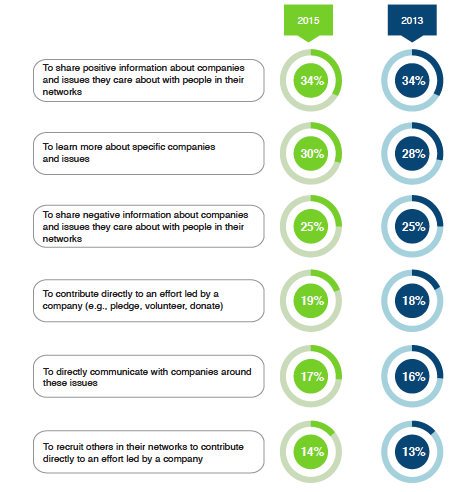Cone Communications, a U.S.-based PR and communications firm, together with Ebiquity, a global marketing analytics specialist, have recently conducted a survey among 9,709 consumers from nine biggest world’s countries by GDP on how they perceive sustainability, learn information about companies’ CSR activities, and make respective purchasing and other important decisions.
The research reveals that global consumers are empowered and informed of sustainability issues more than in 2011 0r 2013. This year, about 88% agree that want companies to tell them what they are doing to operate sustainably. More than ever they want transparency in CSR communications: 76% agree that a company may not be perfect at this area, as long as it is honest about its activities.
84% say they would prefer services and products from socially and environmentally responsible companies. Interestingly, consumers from developing countries show the highest interest in sustainable products and services: India (95%), China (94%), Brazil (93%), while the global index is 90%.
Nevertheless, the number of consumers who would switch to a sustainable products given the same price and quality is declining: from 94% in 2011 to 91% in 2013, to 90% in 2015.
The study shows that over the past four years, consumers have had a better understanding of their impact on environment and social causes. 72% of them believe they make an impact purchasing sustainable products and services. Moreover, they better understand the companies CSR messages: the confusion of corporate sustainability communications has dropped from 71% in 2011 t0 65% in 2015, which is still high though.
The research proves that while digital channels of communications are becoming more important, consumers still prefer to get information on companies’ CSR activities from traditional channels, such as product packaging (87%), in-store environment (81), store employees (57%).
The number of those who seek information on company’s sustainability credentials in earned media (stories, interviews in magazines or websites) or paid media (TV, online or outdoor ads) has declined slightly: from 21% to 15% (2011-2015) and from 16% to 14% respectively. A company’s website and company-sponsored themed community events are still important sources of information.
Vice versa, the effectiveness of social media has nearly doubled from 7% to 13%.
Here is how consumers use social media to address or engage with companies around CSR issues.

More findings along with nine country-scpecific reports are available here (PDF).